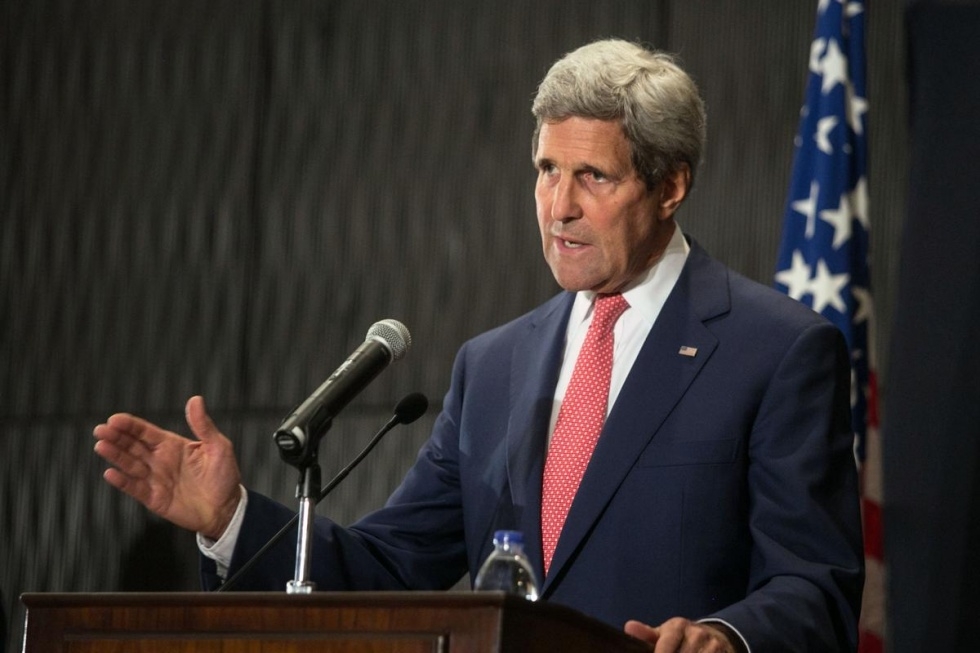Kerry admits anti-IS war will last for years

US Secretary of State John Kerry has emphasised the critical need for a broad coalition to fight against the Islamic State (IS) while testifying in front of the Senate Foreign Relations Committee on Wednesday.
Kerry faced tough questions from the committee on the Obama administration’s justification for deploying military strikes against IS and admitted the battle against the militant group could take “years”.
The Secretary of State also stressed that newly-expanded air strikes against IS did not constitute an invasion by the US or go beyond America’s current legal remit.
“It’s important for people to understand that there is no invasion [by the US]. The invasion was ISIL [IS’ former name] into Iraq…and it’s destructive to every possibility to building a state in that region. Even in a region that is virtually defined by division,” he said.
“They [regional leaders] are more unified on this subject than anything [I’ve seen] in my career.”
Ten Arab states have now signed up for an international US-led coalition to combat IS, although Kerry said that no coalition country, including Sunni partners, were currently considering the deployment of ground troops to fight the militant group that controls large swathes of Syria and Iraq.
In his testimony, Kerry also set out key elements of the plan to fight IS and remained keen to state the collaborative nature of the US-led strategy.
“The two pillars of comprehensive strategy against ISIL: an inclusive Iraqi government, which is essential – there would be no success [otherwise]. And secondly the broad coalition so that the US is not alone,” he said.
“Let me just emphasize that when we say global coalition, we mean it…we have a plan, we know the players, our focus now is determining what each country’s role will be.”
Kerry praised Iraqi authorities for recently appointing a new prime minister, Haider al-Abadi, which he said had created a “unity” government to unite Iraq. However, he did not mention former Prime Minister Nouri al-Maliki who had been accused of alienating Iraq’s Sunni community.
Prime Minister Abadi told the Associated Press on Wednesday that ground troops from an anti-IS coalition were neither wanted nor necessary in the fight against the group, although he did urge the fight against IS to expand into Syria.
On the issue of Syria Kerry told lawmakers that the operation against IS would benefit other groups fighting against the forces of President Bashar al-Assad.
“As ISIL grows weaker, the moderate Syrian opposition will get stronger, that is why it is so critical that Congress pass the authorisation of support [for strikes in Syria],” he said.
Kerry also once again reiterated that US troops “will not have a combat mission” in Iraq, echoing comments made earlier in the day by US President Barack Obama. The president told US soldiers at the Tampa MacDill air force base that combat forces have not and will not be deployed “fighting another ground war in Iraq.”
Both Kerry and Obama’s comments come a day after America’s top general told Congress that the US was considering the need for a limited number of combat troops on a “case by case” basis.
"My view at this point is that this coalition is the appropriate way forward,” General Martin Dempsey, the chairman of the US Joint Chiefs of Staff told the Senate Armed Services Committee.
“But if it fails to be true, and if there are threats to the United States, then I of course would go back to the president and make a recommendation that may include the use of US military ground forces."
However, the recent US decision to expand its anti-IS campaign – even if it continues to insist that combat troops will not be used – remains controversial.
At the US Senate on Wednesday Senator Robert Menendez, chairman of the Foreign Relations Committee, questioned Kerry about whether the Obama administration could use the controversial Authorisation for Use of Military Force (AUMF) to authorise military strikes against IS.
The AUMF was passed in the wake of the 9/11 attacks in New York to justify US military action against al-Qaeda and its affiliates.
Kerry said that they have “very good lawyers who have studied” the AUMF and have concluded it applies to IS, due to a clause in the document authorising action against “associate forces” of al-Qaeda.
“ISIL began as al-Qaeda in Iraq – it only became this thing called ISIL a year ago. It only became that out of convenience…not because their targets changed…they are the same people we were attacking for all those years. A mere publicity stunt…to call yourself something else does not get you out,” he said.
The US has so far launched more than 150 strikes against the group and has helped stem its advance in Iraq. The US expects that it will soon begin launching strikes over the border in Syria, despite the White House’s long held aversion to getting bogged down in the war-torn country.
Middle East Eye propose une couverture et une analyse indépendantes et incomparables du Moyen-Orient, de l’Afrique du Nord et d’autres régions du monde. Pour en savoir plus sur la reprise de ce contenu et les frais qui s’appliquent, veuillez remplir ce formulaire [en anglais]. Pour en savoir plus sur MEE, cliquez ici [en anglais].

